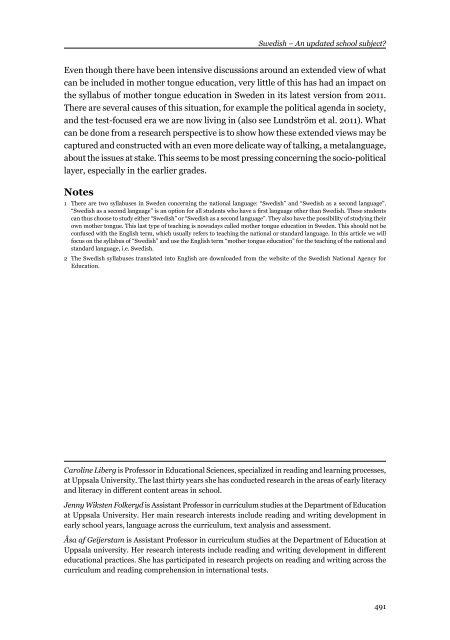Download issue - Lärarutbildning - Umeå universitet
Download issue - Lärarutbildning - Umeå universitet
Download issue - Lärarutbildning - Umeå universitet
Create successful ePaper yourself
Turn your PDF publications into a flip-book with our unique Google optimized e-Paper software.
Swedish – An updated school subject?<br />
Even though there have been intensive discussions around an extended view of what<br />
can be included in mother tongue education, very little of this has had an impact on<br />
the syllabus of mother tongue education in Sweden in its latest version from 2011.<br />
There are several causes of this situation, for example the political agenda in society,<br />
and the test-focused era we are now living in (also see Lundström et al. 2011). What<br />
can be done from a research perspective is to show how these extended views may be<br />
captured and constructed with an even more delicate way of talking, a metalanguage,<br />
about the <strong>issue</strong>s at stake. This seems to be most pressing concerning the socio-political<br />
layer, especially in the earlier grades.<br />
Notes<br />
1 There are two syllabuses in Sweden concerning the national language: “Swedish” and “Swedish as a second language”.<br />
“Swedish as a second language” is an option for all students who have a first language other than Swedish. These students<br />
can thus choose to study either “Swedish” or “Swedish as a second language”. They also have the possibility of studying their<br />
own mother tongue. This last type of teaching is nowadays called mother tongue education in Sweden. This should not be<br />
confused with the English term, which usually refers to teaching the national or standard language. In this article we will<br />
focus on the syllabus of “Swedish” and use the English term “mother tongue education” for the teaching of the national and<br />
standard language, i.e. Swedish.<br />
2 The Swedish syllabuses translated into English are downloaded from the website of the Swedish National Agency for<br />
Education.<br />
Caroline Liberg is Professor in Educational Sciences, specialized in reading and learning processes,<br />
at Uppsala University. The last thirty years she has conducted research in the areas of early literacy<br />
and literacy in different content areas in school.<br />
Jenny Wiksten Folkeryd is Assistant Professor in curriculum studies at the Department of Education<br />
at Uppsala University. Her main research interests include reading and writing development in<br />
early school years, language across the curriculum, text analysis and assessment.<br />
Åsa af Geijerstam is Assistant Professor in curriculum studies at the Department of Education at<br />
Uppsala university. Her research interests include reading and writing development in different<br />
educational practices. She has participated in research projects on reading and writing across the<br />
curriculum and reading comprehension in international tests.<br />
491

















